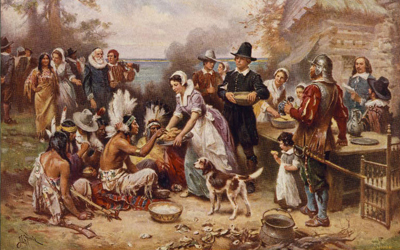I’m sitting in my local Starbucks, in the heart of Hollywood, Florida’s modern Orthodox neighborhood, and I overhear two Orthodox Jewish men arguing.
They were arguing over whether it is permissible for Orthodox Jews to celebrate Thanksgiving.
As one of them said: “Thanksgiving is a gentile holiday. It is forbidden to us.”
Oh, please.
Thanksgiving is Jewish.
Let us go back to 1776 – August, to be precise.
A month before, the Continental Congress had drafted the Declaration of Independence. One of that document’s architects, Benjamin Franklin, sat down, and he thought about the question that any startup has to deal with – what will our logo be?
Franklin wanted the Great Seal of the United States to feature a scene of Moses standing at the shores of the Red Sea, and the waters preparing to devour Pharaoh and his armies.
And, not only Ben Franklin. Thomas Jefferson wanted the Great Seal to depict the Israelites in the wilderness, following their flight from Egypt, but before their arrival in Canaan.
They lost.
In Brooklynese, they wuz robbed.
The Puritans had it rough in England. So rough, that they imagined that they were Jews.
In the words of John Winthrop: “despised, pointed at, hated of the world, made a byword, reviled, slandered, rebuked, made a gazing stock, called Puritans, nice fools, hypocrites, hare-brained fellows, rash, indiscreet, [and] vain-glorious.”
And so, they made their exodus. The Atlantic Ocean became their Red Sea. They saw the Plymouth Colony as their promised land. That is why so many places in New England bear biblical names: Salem, Massachusetts; Bethel, Connecticut; Canaan, Connecticut; New Canaan, Connecticut, Sharon, Massachusetts.
Throughout history, many Americans have read the Bible, and they see our story as the blueprint for their own stories.
For what is the Jewish Bible? It is the story of migration and exile. It is Abraham leaving Ur. It is Jacob leaving the land of Israel, and then returning, and then leaving, and then returning once again. It is Moses leading his people out of Egypt. It is the Israelites entering the land – and then leaving, and going to Babylon, and then coming back.
Can there be any doubt, therefore, why the story of the Exodus has been so important to the way that we Americans understand ourselves?
This is how Thanksgiving became a Jewish holiday.
The settlers in Plymouth knew that they had to give thanks.
When the Pilgrims looked for a way of celebrating their freedom, and their entry into a new land – what did they do?
They took the idea of the harvest – and they took the idea of freedom – and they combined the two of them. Thanksgiving is not just Sukkot; it is actually a seder of freedom. It is the American Sukkot – and the American Pesach, combined.
Many of you already know that. It is virtually an American Jewish cliché.
But – let us now ask ourselves:
How did the Pilgrims even know that they should give thanks?
Was it simply that basic human instinct – to express gratitude?
Actually, not.
This is unbelievable.
The Pilgrim leader, William Bradford, had a copy of the Bible on the Mayflower. He would later become the governor of Plymouth Colony.
His edition of the Bible had notes written in it – handwritten notes that had been put there by a Puritan scholar, Henry Ainsworth.
Ainsworth had written out a list of events that require a prayer of thanksgiving to God.
The sick, when he is healed; the prisoner when he is released out of bonds; they that go down to sea, when they are come up (to land); and wayfaring men, when they are come to the inhabited land.
And whom does Ainsworth quote – as his authority for when you are supposed to give thanks?
A man whom he calls – Maimony.
Ainsworth had copied over an English version of Maimonides’ comprehensive legal code, the Mishneh Torah – specifically, the laws of giving thanks.
Therefore, the entire holiday of Thanksgiving is not only quintessentially American.
It is also quintessentially Jewish.
As the Puritans took the Exodus and made it a map for understanding the oppression and progress of their own lives and souls, let us take their story, and let us remember it, and let us live it.
I end with the words of the Puritan clergyman, Robert Cushman:
We are all, in all places, strangers and pilgrims, travelers and sojourners; most properly, having no dwelling but this earthen tabernacle. Our dwelling is but a wandering; and our abiding, but as a hastening away; and, in a word, our home is nowhere but in the heavens; in that house not made with hands, whose maker and builder is God.
Let that be the truth that we preserve for ourselves, as well.






